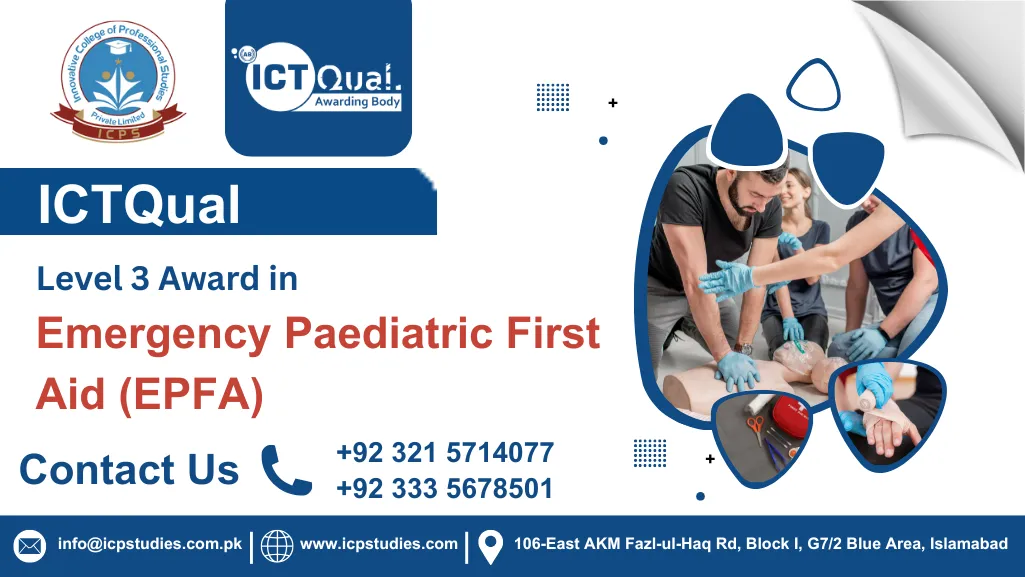The ICTQual AB Level 3 Award in Emergency Paediatric First Aid (EPFA) is a specialised one-day qualification designed to equip learners with essential life-saving skills for responding to medical emergencies involving infants and young children. ICTQual AB Level 3 Award in Emergency Paediatric First Aid (EPFA) covers a wide range of emergency scenarios, including paediatric CPR, the use of an automated external defibrillator (AED), managing choking incidents, controlling bleeding, treating burns and scalds, responding to seizures, and providing care for children experiencing shock.
Tailored for those responsible for the care and supervision of children such as early years practitioners, nursery staff, school personnel, childminders, parents, and guardians the EPFA course ensures learners can respond swiftly and effectively during critical situations. ICTQual AB Level 3 Award in Emergency Paediatric First Aid (EPFA) blends practical, hands-on activities with clear theoretical guidance, reinforcing both competence and confidence.
Upon successful completion of ICTQual AB Level 3 Award in Emergency Paediatric First Aid (EPFA), learners will gain a recognised Level 3 qualification in Emergency Paediatric First Aid, typically valid for three years. ICTQual AB Level 3 Award in Emergency Paediatric First Aid (EPFA) demonstrates a commitment to child safety, aligns with workplace compliance requirements for childcare settings, and strengthens the learner’s ability to safeguard young lives.
All About ICTQual AB Level 3 Award in Emergency Paediatric First Aid (EPFA)
Course Overview
The ICTQual AB Level 3 Award in Emergency Paediatric First Aid (EPFA) is designed to equip learners with the essential knowledge and practical skills needed to provide effective first aid to infants and children in emergency situations. This qualification covers vital areas such as managing unresponsive children, CPR, choking, bleeding, burns, and other common paediatric emergencies.
It is ideal for individuals working in early years settings, schools, childcare centres, and nurseries, as well as parents and guardians who want to gain confidence in handling medical emergencies involving children. The course ensures compliance with workplace health and safety requirements and prepares learners to act promptly, safely, and effectively in critical situations.
By enrolling in this qualification, learners gain a recognized certification that enhances their professional credibility while contributing to the safety and well-being of children in their care.
Study Units
- Roles and Responsibilities of the Paediatric First Aider
- Assessing an Emergency Situation and Ensuring Safety
- Administering First Aid to an Infant or Child Who is Unresponsive and Not Breathing Normally
- Providing First Aid for Paediatric Medical Emergencies, Injuries, and Shock
- Learners must be 16 years or older at the time of enrollment, as the qualification requires maturity and responsibility when dealing with emergencies.
- There are no formal academic entry requirements, making the course accessible to anyone interested in gaining first aid skills.
- A basic level of English reading, writing, and communication skills is recommended to understand instructions, training materials, and assessment requirements.
- Learners should be in suitable health and fitness to carry out practical demonstrations such as cardiopulmonary resuscitation (CPR), placing a child in the recovery position, and managing choking incidents.
- This qualification is ideal for those working in or aspiring to roles within early years education, childcare, nurseries, schools, sports clubs, and community organizations where the safety of children is a priority.
- Parents, guardians, babysitters, and foster carers may also enroll to build confidence in managing emergency situations involving infants and children.
- Employers may require staff in Ofsted-regulated or child-focused environments to hold a paediatric first aid certificate to meet health and safety or statutory requirements.
- Individuals working in childcare settings such as nurseries, preschools, and early years education centers.
- Teachers, teaching assistants, and school staff responsible for the care and supervision of children.
- Babysitters, nannies, and childminders seeking a recognized qualification to enhance their skills and employability.
- Parents, guardians, and foster carers who wish to be better prepared to respond to emergencies involving infants and children.
- Community workers, sports coaches, and youth leaders who regularly engage with children and young people.
- Anyone looking to meet statutory requirements for paediatric first aid certification in child-focused environments.
- Individuals with no previous first aid training who want to develop essential emergency response skills specifically for paediatric care.
Learning Outcomes
- Understand the roles and responsibilities of a paediatric first aider in emergency situations.
- Learn how to assess an emergency situation and ensure the safety of infants, children, and responders.
- Gain the skills to provide cardiopulmonary resuscitation (CPR) and use an automated external defibrillator (AED) on infants and children.
- Recognize and respond appropriately to choking incidents in infants and children.
- Learn how to manage unresponsive children, including placing them in the recovery position.
- Develop the ability to treat wounds, bleeding, burns, and scalds effectively.
- Understand how to manage shock, seizures, allergic reactions, and other common paediatric emergencies.
- Build confidence to act quickly and effectively to preserve life and prevent further injury until professional help arrives.
FAQs ICTQual AB Level 3 Award in Emergency Paediatric First Aid (EPFA)

